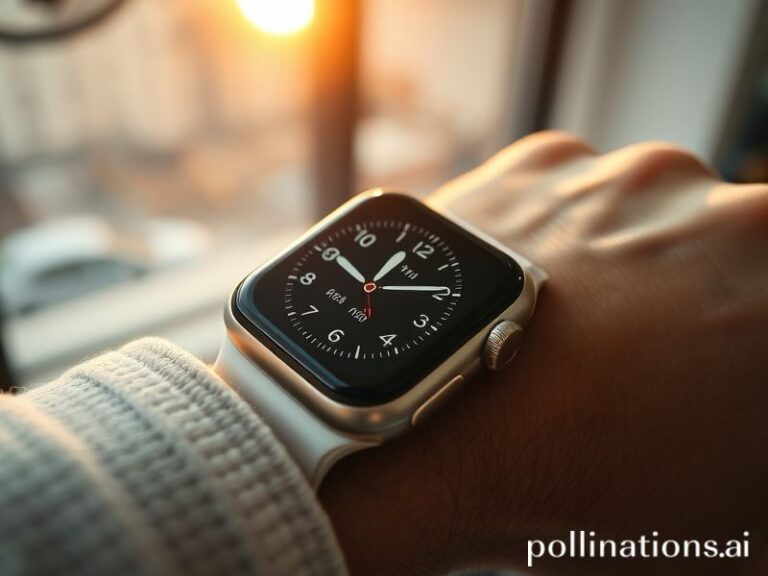From Saigon Sweatshops to Davos Panels: How Tiffany Stratton Became the World’s Sparkly Stress Ball
The Curious Case of Tiffany Stratton and the Global Glitter Bomb
By: Our Tokyo Correspondent, still jet-lagged since the Lehman Brothers after-party
Somewhere between the neon fallout of WrestleMania XL and whatever fresh geopolitical dumpster fire is trending on X this week, Tiffany Stratton pirouetted into the collective consciousness of 3.4 billion Wi-Fi-enabled eyeballs. The American grappler—equal parts pink confetti and calculated menace—has become an unlikely Rorschach test for our battered planet. To Singaporean finance bros she’s a leveraged buy-out in sparkly spats; to Berlin club kids she’s a post-capitalist fever dream; to Lagos TikTokers she’s simply “Premium Barbie with chokehold DLC.”
The international press, ever hungry for a distraction that isn’t mushroom-shaped, latched on. Le Monde called her “le phénomène satiné”; Al-Jazeera ran an explainer subtitled “Why Your Teenage Cousin Now Speaks Fluent WWE.” Even the staid Financial Times folded her into a think-piece on “soft-power monetization in the attention recession,” which is journo-speak for “please click something, anything, before the next quarterly bloodbath.”
Stratton’s gimmick—a pampered trust-fund heel who can moonsault your vertebrae into origami—plays differently from continent to continent. In Dubai, her “daddy’s AmEx” shtick scans aspirational; in Buenos Aires, it’s delicious villainy; in Seoul, the marketing departments simply photoshop the credit card into a Samsung Pay wristband and call it localization. One Seoul-based brand strategist told me, off the record, that Stratton merch moves faster than kimchi futures during a cabbage blight. “We slap a Hangul pun on the shirt, triple the price, and watch the kids mortgage their gaming rigs,” he laughed, before excusing himself to join a conference call about “AI-generated influencers with better ROI than humans.”
Of course, no planetary micro-fad escapes the supply-chain hydra. The same week Stratton debuted a new bedazzled championship belt on SmackDown, a factory in Ho Chi Minh City pivoted from knockoff Stanley cups to knockoff Stratton tiaras. Somewhere in Shenzhen, a 19-year-old quality-control intern now spends twelve-hour shifts stress-testing rhinestones against simulated blood spatter. She WhatsApps her friends: “At least it’s not lithium mines.” You can almost hear the hollow optimism ping across the South China Sea.
The darker corners of the web have already weaponized her image. Russian Telegram channels splice her entrance video with drone footage from Kharkiv; 4chan threads debate whether her finisher could “solve the border crisis.” Meanwhile, an Iranian dissident rapper samples her catchphrase over trap beats, auto-tuned to sound like a muezzin on nitrous oxide. The song is titled “Daddy’s Money, Mother’s Tears”—currently charting in Istanbul, Beirut, and, strangely, Reykjavik.
UNICEF hasn’t commented, but the World Economic Forum already booked her for a Davos panel next January: “Athletic Soft Power in the Polycrisis.” Ticket sales are brisk; if the planet’s still spinning, hedge-fund titans will sip USD 27 hot chocolates while Stratton explains why kayfabe is the last reliable narrative left. The irony, naturally, will be lost in the thin Alpine air.
So what does it all mean? Perhaps nothing. Perhaps everything. In a world where elections are decided by meme momentum and oligarchs cosplay as populists, a blonde Midwesterner in diamanté elbow pads feels as coherent a compass as any. When the glaciers finish their slow-motion swan dive and the sea finally reclaims the Maldives, future archaeologists may unearth a cracked Stratton action figure and conclude we worshipped chaos in high-gloss packaging. They won’t be wrong.
For now, Tiffany Stratton keeps cartwheeling across our glowing rectangles, the latest glitter bomb in a century already choking on confetti. We watch, we retweet, we order the knockoff tiara. Somewhere, an intern in Vietnam files another QC report; somewhere else, a hedge-fund algorithm buys the dip in rhinestone futures. The show, like the planet, spins on—improbably, irresponsibly, and just fast enough to blur the cracks.







